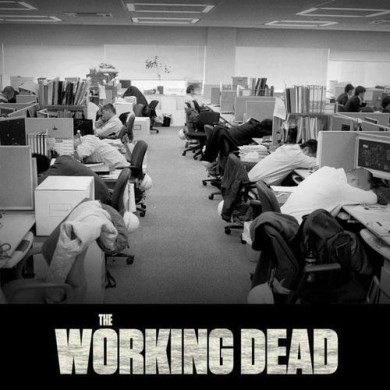Just how engaged is your staff? Are they plugged or just going through the motion?
This article by Denise Scott was recently published at her website Denise B Scott Catalyst for Change and is published here with permission.
You can’t really turn on the TV or go into a bookstore without seeing some mention of the pending zombie apocalypse. They’ve already invaded our popular culture, so it seems like only a matter of time before they actually start showing up and snacking on people, right? But it’s worse than that. It’s worse than you can possibly imagine. Because they’re already here. You’ve seen them. You probably work with one. And they’re slowly, insidiously infecting others they come in contact with. They have Zombie Brain. I’ve been speaking a lot about zombie brain lately, sharing with groups the danger of The Working Dead: Those employees who have outlived their usefulness and are trying to infect all those they come in contact with. The zombies in your organization don’t start off wanting to be the working dead. Others around them, those who aren’t pulling their weight or who are constantly sharing negative thoughts, slowly infect them, spreading employee disengagement like a slow plague.
How Many Do You Have in Your Organization?
Gallup studies show that more than 20% of your staff are actively disengaged and infected with zombie brain. They can be characterized by their lack of commitment to the organization or their coworkers and their constant negativity. Not only are they not pulling their own weight, they are actually working against all that you are trying to accomplish. They are “actively” disengaged because they are tearing down what you are trying to build! Think about that! One out of every five people you encounter today at work is working against you. (Try not to be too paranoid as you pass people in the hall.)
What Zombie Brain is Costing You in Dollars
There is a business impact to all those zombies stumbling around. Gallup’s research shows that when compared to low engagement businesses, those with the highest engagement have:
- 37% lower absenteeism
- 10% higher customer metrics
- 22% higher profitability
- 48% fewer safety incidents
- 41% fewer patient safety incidents
Think about the dollars involved with those above numbers! And the impact any of them would make in your own organization. Most importantly, think about the difference all those double-digit improvements would make in patients’ and residents’ lives!
What Can You Do About It?
So how can you, one single person, take on an army of zombies? While I don’t recommend a crossbow, here are some ideas that you can add to your arsenal:
- Fight Your Own Battle. There is no single model for improving employee engagement. What works in one place might not work in yours. Learn from others and read as much as you can. But in the end, fight your zombies in your own way. Trying to create an exact replica of what was successful in another organization never works.
- Don’t Friend the Zombies. Despite what you might think, I’m not the eternal optimist. Leadership is tough stuff. You can’t always be the boss who is a friend. Do that and your zombies will never get dealt with, will continue to infect others and you’ll be left with a cast of characters way scarier than anything on television. You know that person you were thinking of when I described the characteristics of a zombie? The one you have given lots of chances to but nothing’s changed? Get rid of them.
- Take Action or Perish. There are a thousand and one books on employee engagement. You can study every one of them but it doesn’t really matter if you fail to do anything with all that information. Profoundly simple I know. Yet this simple concept stands in the way of so many leaders. You know what you should be doing, but are you doing it? If I asked your employees what would they say?
So, you can either be the Daryl Dixon of your organization, fighting the good fight, and taking down the zombies for the benefit of the rest of your group, or you can risk infection yourself.
Be safe out there,
Denise








